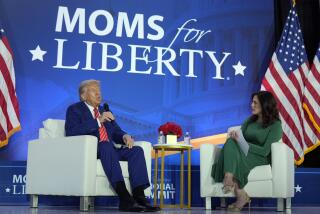New British Envoy Is No Stranger to U.S. : Diplomacy: Robin Renwick, with talent for making friends in high places, takes up his post on Tuesday.
In an era when President Bush picks up the phone and chats with Prime Minister John Major, the new British ambassador to the United States believes there is still room for personal diplomacy.
For Robin Renwick, 53, who takes up his post in Washington on Tuesday, has a knack for making friends in high places in the countries to which he has been assigned.
This tall, tanned and trim Foreign Office high-flier in his last assignment--four years as ambassador to South Africa--grew close to both President Frederik W. de Klerk and black nationalist leader Nelson Mandela. To both, he urged negotiations toward a new constitution, arguing that the only alternative to “negotiations now is negotiations later, and later will be worse.”
As for his new role, he comes prepared, having served in Washington from 1981 to 1984, and is familiar with how the diplomatic game is played. He first met Bush when he was vice president. Then, Renwick did much of the negotiating for arms supplies and intelligence that the United States provided Britain during the Falklands War.
Renwick expects to have much direct contact with American officials, despite the frequency of telephoning between heads of government and foreign secretaries, and says wryly, “I don’t expect to be underemployed.”
Renwick arrives at a time when Anglo-American relations are in splendid shape, partly as a result of the large British military contribution to the Gulf War, and the personal cordiality between Bush and Major and Foreign Secretary Douglas Hurd and Secretary of State James A. Baker III.
But the new envoy is not keen on the phrase “special relationship” describing the closeness between the Americans and the British, declaring: “I don’t really like the term very much. Not because the relationship isn’t special, but because it carries too much baggage with it--it implies there won’t be problems. But there will be problems.”
Part of his job, as Renwick sees it, is remaining in close touch with opinion makers in Washington, particularly in Congress. There, it will be his job to explain the British position on such contentious issues as the Vietnamese boat people in Hong Kong, transatlantic air rights, how to deal with Iraq and the difficult global trade negotiations.
With Britain a member of the European Community, Renwick will also be required to explain EC policies to Americans, who tend to be suspicious that a new Fortress Europe may be in the mill. And Renwick realizes that he will be constantly called to account for British policies in Northern Ireland, though he says that many Americans have developed sympathy for the British position there.
Renwick pointed out that British investment in the United States is about $120 billion, almost twice as much as Japan’s. “I am not a romantic,” he said. “You have to look at this very hard. The reality is as much the $120 billion as what happened 40 or 50 years ago,” a reference to close cooperation in World War II.
Renwick was educated at Cambridge University and the Sorbonne in Paris, served two years in the British army, then joined the Foreign Office, with postings in Senegal, India and Paris. He spent a year at Harvard, writing a thesis on the history of economic sanctions, concluding that they do not work. He was knighted in 1989. Renwick and his wife, Annie, have a son and daughter.
As for his U.S. experience, one diplomatic specialist who knows Renwick well says: “When he says he likes America and Americans, he really means it.”
More to Read
Sign up for Essential California
The most important California stories and recommendations in your inbox every morning.
You may occasionally receive promotional content from the Los Angeles Times.






